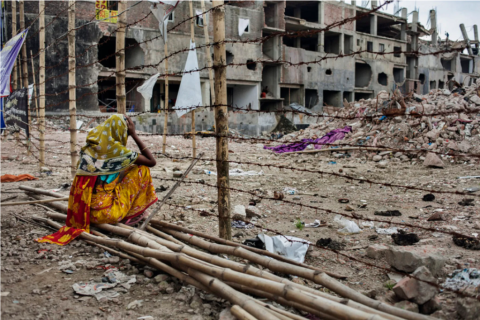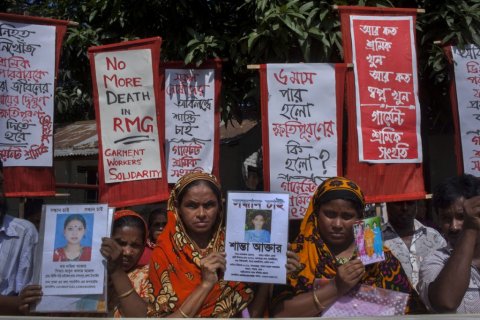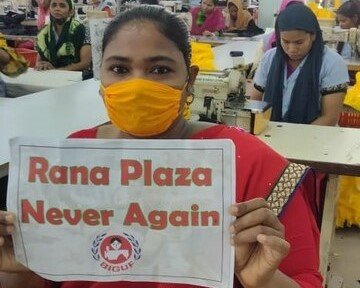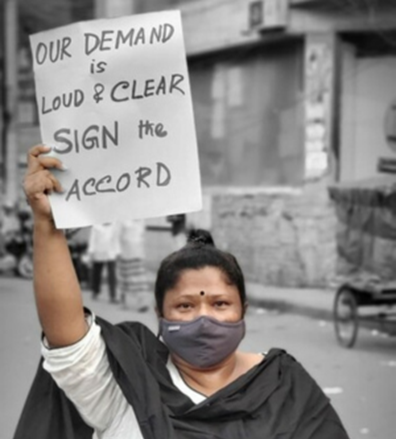
Photo: Rina's mother waits for her missing daughter by Rana Plaza debris.
(July 2013, Taslima Akhter)

Photo: Relatives of Rana Plaza's workers demand justice.
(October 2013, Taslima Akhter)

Photo: Worker remembers Rana Plaza and calls for the International Accord.
(April 2021, BIGUF / CCC)

Photo: Kalpona Akter, Founder & Executive Director of the
Bangladesh Center for Workers Solidarity.

Photo: Members of the CNCA deliver petition to Canadian Parliament
calling for mandatory due diligence law (CNCA).
This April 24 marks the tenth anniversary of the tragic and preventable Rana Plaza disaster, in which at least 1,138 garment workers were killed and more than 2,500 were seriously injured when the building housing five garment factories collapsed. We stand in solidarity with the survivors and families of those who died as they honour and remember their loved ones.
Garment and textile workers in Bangladesh, and the global network of trade unions, women’s and labour rights organizations that support them, are calling on major apparel brands and retailers to sign onto the International Accord for Health and Safety in the Textile and Garment Industry and the more recent Pakistan Accord.
A factory fire in Pakistan earlier this month points to the urgency for companies sourcing from that country to take responsibility for the safety of workers in their supply chain and sign the Pakistan Accord. On April 13, in Karachi, Pakistan, four fire fighters were killed and 13 people were injured when a factory building that caught on fire suddenly collapsed. This tragedy could have been prevented had there been adequate safety measures in place, such as those required under the International and Pakistan Accords.
The two new Accords build on the experience of the life-saving Bangladesh Accord, which was established in the immediate aftermath of the Rana Plaza tragedy and has brought major improvements in fire and building safety in over 1,600 factories in Bangladesh. Its success is due to its legally binding nature, independent factory inspection and remediation program, an anonymous complaints mechanism, health and safety training for workers, transparency, union participation in governance, and the obligation on brands sourcing from Accord factories to financially support safety remediation.
To date, 197 companies have signed onto the International Accord and 49 have signed onto the Pakistan Accord.
Take Action
- Tell brands to sign the International and Pakistan Accords. Brands on the ‘Wall of Shame’ have failed to protect the health and safety of the workers that make their products. Urge these brands to sign the Accords now.
- Leave a commemorative message to honour and remember those killed in this preventable tragedy.
- View and share the Rana Plaza Never Again Timeline, documenting major factory safety incidents and labour movement demands in Bangladesh since 2005.
Bangladeshi unions demand respect for labour rights
This year, in addition to calling on clothing companies to sign the life-saving International and Pakistan Accords, Bangladeshi unions continue to demand respect for their basic labour rights and to call for a long overdue increase in the minimum wage.
“Garment workers need unions, safe factories to work in, freedom of association and collective bargaining, and an end to gender based violence," said Nazma Akter, Founder and Executive Director of the Awaj Foundation in Bangladesh. "Mandatory due diligence must be ensured and North American brands should sign the Accord. By signing the Accord, they respect the workers and they respect freedom of association, because the Accord is legally binding.”
While the Bangladesh Accord made significant advances in health and safety in the country’s garment factories, various labour issues remain unresolved:
- Workers are still paid poverty wages that prevent them from meeting their basic needs – a situation made increasingly precarious by rising inflation.
- Workers’ associational rights continue to be undermined. Over 1,000 factory level unions have been registered since the Rana Plaza disaster, however, less than 50 of those unions have been successful in signing collective bargaining agreements.
- Major importing countries, including Canada, lack meaningful mandatory human rights and environmental due diligence legislation that could ensure human rights abuses are prevented and addressed throughout companies’ global supply chains.
Quebec and Canadian organizations commemorate Rana Plaza, call for due diligence legislation
On April 24, various community-based, international solidarity and labour organizations from Quebec and Canada, many of whom are members of the Canadian Network on Corporate Accountability (CNCA), are holding a rally in Montreal to commemorate the Rana Plaza tragedy. In solidarity with victims’ families and garment workers in Bangladesh, they are calling on Canadian companies to sign the International Accord and respect the rights of garment workers, including the rights to freedom of association, a living wage, and healthy, safe, and equitable working conditions. These organizations are also demanding that Canada adopt human rights due diligence legislation. More here (in French and English).
On April 25, the CNCA will also hold meetings with Members of Parliament in Canada’s capital city of Ottawa to deliver a petition, with 39,500 signatures, calling for due diligence legislation and to discuss steps Canada needs to take to prevent human rights abuses and environmental destruction linked to companies’ global supply chains.
“Weak laws that merely require reporting will not protect the human rights of workers and women in the global garment trade, or make corporations accountable," said Kalpona Akter, Founder & Executive Director of the Bangladesh Center for Workers Solidarity. "However, if you pass due diligence laws to make sure that every company has to identify, prevent and mitigate human right risks in its whole value chain...you can help save and improve many millions of lives.”
The commemorations and actions this week send a clear message to global apparel companies and governments in importing countries: It should not take another tragedy like Rana Plaza or this month’s fire and building collapse in Pakistan, for companies to take responsibility for the harms that occur in their global supply chains. Companies’ profits and those of their CEOs and shareholders should not trump safe working conditions and workers' right to a living wage.
- Sign the Petition to the House of Commons of Canada: Adopt human rights and environmental due diligence legislation (will close April 24 at midnight)
- Never again: Canada’s unions mark 10 years since the Rana Plaza factory collapse - solidarity statement from the Canadian Labour Congress (CLC), representing 3 million workers in Canada.
- Short graphic novel, Made in Rana Plaza (Fabriqué au Rana Plaza) written by François Simard and Coordinated by the Quebec Association of International Cooperation Organizations (l’AQOCI in French)